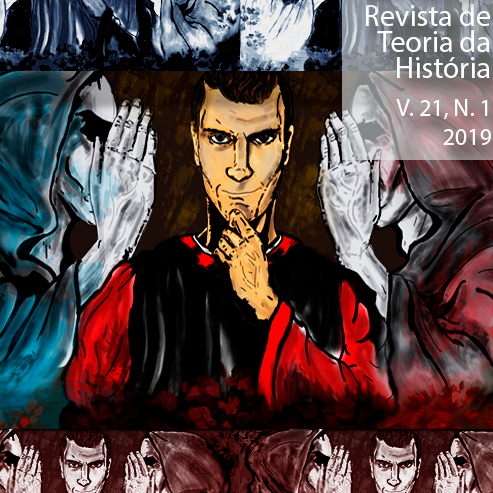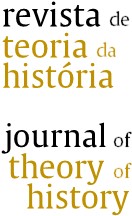From Time of Revolutions to revolutions of time
Keywords:
Revolution, Evolution, Modernity, History Theory, TimeAbstract
The purpose of the text is to discuss the passage of the revolution as an important category of political science to a more cultural approach trying to perceive what was revolutionary in each event. In the first moment I discuss about the obsession a revolutionary event that was associated with a national element as entry into modernity. . From a unique and progressive time, revolution became a banner capable of sustaining the solution to a crisis, separating the old from the new. However, its rise accompanied its fall and in century XX, the category and the concept happened to be strongly criticized. The obsolescence of the revolution was rescued by a more cultural approach, bringing to the fore new characters, new narratives and new conceptualizations. As a consequence of the plurality of temporalities, progressive and evolutionary time could be questioned and overcome.
References
ARTFL Encyclopédie Project. “Guerre”, vol. 7, 1757, Disponível em:< http://artflsrv02. uchicago.edu/cgi-bin/philologic/getobject.pl?c.6:1652.encyclopedie0513> Acesso em: 20 jan. 2017.
ÁVILA, Arthur Lima de. “O fim da história e o fardo da temporalidade”. Tempo e argumento,v.10, 2018.
BENJAMIN, Walter; LOWY, Michel. “Tese IX”. In:____. Walter Benjamin: aviso de incêndio: uma leitura das teses “Sobre o conceito de história”. São Paulo: Boitempo, 2005.
BEVERNAGE, Berber; LORENZ, Chris. “Breaking up Time. Negotiating the Borders between Present, Past and Future”. Storia diografia, 65, 1, 2013.
BURGESS, Glenn. “On revisionism: an analysis of Early Stuart historiography in the 1970s and 1980s”. In: The Historical Journal, 33, 3, 1990.
BURKE, Edmund. Reflexões sobre a Revolução na França. São Paulo: EDIPRO, 2014.
BURKE, Peter. O que é história cultural? Rio de Janeiro: Zahar, 2008.
CANAPARO, Claudio. “La ideiade revolución en la periferia”. SÉMATA, Ciencias Sociais e Humanidades, 2016, vol. 28.
CERTEAU, Michel de. “A produção do tempo: uma arqueologia religiosa”. In:____. A escrita da História. Rio de Janeiro: Forense, 2011.
CLARK, J. C. D.. Revolution and Rebellion: state and society in England in seventeenth and eighteenth centuries. Cambridge: Cambridge University Press, 1999.
CLARK, Stuart. “French Historians and Early Modern Popular Culture”. Past and Present, n.100, Ago/1983.
COHN, Norman. Na Senda do Milênio: milenaristas revolucionários e anarquistas místicos da Idade Média. Lisboa: Editorial Presença, 1971.
COOPER, Brian. “The Academic Re-discovery of Apocalyptic Ideas in the 17th Century”. The Baptist Quartely. N. 18-19, 1960-1961.
DUNN, John. “Revolution”. In: BALL, Terence; FARR, James; HANSON, Russell L. (Ed.). Political Innovation and Conceptual Change.Massachusetts, Harvard University Press, 1999.
FORSTER, Robert; GREENE, Jack. Revolutiones y rebeliones de la Europa moderna. Madrid: Alianza Editorial, 1984.
FULBROOKE, Mary. “The English Revolution and the revisionist revolt”. In: Social History,Vol. 7, No. 3 (Oct., 1982).
GARDNER, Samuel. The first two Stuarts and the Puritan Revolution (1603-1660). New York: Charles Scribner’s sons, 1890.
GINZBURG, Carlo Mitos, emblemas, sinais: morfologia e história. São Paulo: Companhia das Letras, 1989.
GOLDIE, Mark. “The Civil Religion of James Harrington”. In: PAGDEN, Anthony. The language of Political Theory in Early-Modern Europe, Cambridge: University of Cambridge, 1987.
GOLDSTONE, Jack. “Theories of Revolutions: the third Generation”. Work Politics. Vol. 32, No. 3 (Apr., 1980).
GUIZOT, François. History of the English revolution of 1640 :from the accession of Charles I. to his death. London: D. Bogue, 1848.
HARTOG, François. Regimes de historicidade: presentismo e experiências do tempo. Belo Horizonte: Autêntica Editora, 2013.
HAZARD, Paul. La crisis de la conciencia europeia (1680-1715). Madrid: Alianza Editorial, 1988.
HILL, Christopher. “Christopher Hill por Christopher Hill”. In: Varia História, Belo Horizonte, nº 14, Set/95.
HILL, Christopher. A Bíblia inglesa e as revoluções do século XVII. Rio de Janeiro: Civilização Brasileira, 2003.
HILL, Christopher. O Mundo de Ponta-Cabeça: Ideias Radicais durante a Revolução Inglesa de 1640. São Paulo: Companhia das Letras, 1987.
HOBSBAWM, Eric. “The general crisis of the european economy in the 17thcentury”, Past & Present, No. 5 (1954).
HOBSBAWM, Eric. Rebeldes Primitivos: Estudos sobre Formas Arcaicas de Movimentos Sociais nos Séculos XIX e XX. Rio de Janeiro: Zahar Editores, 1978.
KENYON, John. “Revisionism and Post-Revisionism in Early Stuart History”. In: The Journal of Modern History, Vol. 64, No. 4 (Dec., 1992).
KOSELLECK, Reinhart. Futuro Passado: contribuição semântica dos tempos históricos. Rio de Janeiro: Contraponto: Ed. PUC-Rio, 2006.
MACAULAY, Thomas Babington. The History of England: From the Accession of James I. Vol. II, London: J. M. Dent & Sons Ltda.,, 1953.
MANNHEIM, Karl. Ideologia e Utopia. Rio de Janeiro: Guanabara, 1986.
MARX, KARL. “A chamada acumulação primitiva”. In:____.. O Capital: para a crítica da economia política. Livro I, volume II, Rio de Janeiro: Civilização Brasileira, 2013.
MARX, Karl. O 18 Brumário de Luís Bonaparte e Cartas a Kugelmann. Rio de Janeiro: Paz e Terra, 1997.
MARX, Karl; ENGELS, Friedrich. “England’s 17th Century Revolution”. Disponível em: <https://www.marxists.org/archive/marx/works/1850/02/english-revolution.htm> Acesso em: 15 jun. 2017.
MONTESQUIEU, Charles de Secondat, Baron de. O espírito das leis. São Paulo: Martins Fontes, 1996.
MOUSNIER, Roland; ELLIOTT, J. H.; STONE, Lawrence; TREVOR-ROPER, H. R; KOSSMANN, E. H.; HOBSBAWM, E. J.; HEXTER, J. H.. “Discussion of H. R. Trevor-Roper: "The General Crisis of the Seventeenth Century." Past & Present, No. 18 (Nov., 1960).
MUDROVCIC, María Inés. “Historical Narrative as a Moral Guide and the present as History as an Ethical Project”. História da historiografia.Ouro Preto, n. 21, 2016.
OAKESHOTT, Michael. El racionalismo en la política y otros ensayos. México, DF: Fondo de Cultura Económica, 2000.
ORWELL, George. Lutando na Espanha.eBooksBrasil, 2002.PAINE, Thomas. The rights of Man. London: W.T. Sherwin, 1817.
PRICE, Richard. A Discourse on the Love of Our Country, delivered on Nov. 4, 1789, at the Meeting-Housein the Old Jewry, to the Society for Commemorating the Revolution in Britain. With an Appendix. Second edition (London: T. Cadell, 1789). Disponível em: <http://oll.libertyfund.org/titles/price-a-discourse-on-the-love-of-our-country> Acesso em: 22 jan. 2017.
RUFER, Mario. “Memoria sin garantias: usos del pasado y política del presente”. Anuario de investigación, 2009.
SANTOS JUNIOR,J.F.. “A emergência do “moderno” conceito de revolução”. História da historiografia, v. 26, p. 122-147, 2018.
SANTOS JUNIOR, Jaime Fernando dos. “Reflexões historiográficas sobre os usos da categoria e do conceito de Revolução para a guerra civil e Interregno na Inglaterra (1640-1660)”. Revista 7 mares, n.2, abril 2013.
SEBASTIAN, J. F.; FUENTES, J. F. “Entrevista com Reinhart Koselleck”. In: JASMIM, M.G. ; FERES JR, J. (Org). História dos Conceitos: Debates e Perspectivas. Rio de Janeiro: Editora PUC –Loyola,2006.
SETH, Sanjay. “Razão ou Raciocínio? Clio ou Shiva?”. História da historiografia. Ouro Preto, n. 13, abril 2013.
SKINNER, Quentin. “Interpretação, racionalidade e verdade”. In: ___.Visões da política sobre os métodos históricos. Algés: Difel, 2005.
STEWART, Charles. “Historicity and Antropology”. The Annual Review of Antropology. 2016.
STONE, Lawrence. Causas da Revolução Inglesa 1529-1642. Bauru: EDUSC, 2000.
THOMASSEN, Bjorn. “Notes toward na Antropology of Political Revolutions”. Comparative Studies in Society and History.2012,54 (3).
TREVOR-ROPER, H. R. “The General Crisis of the 17thcentury”. Past & Present. No. 16 (1959).
TREVOR-ROPER, H. R. “The General Crisis of the 17thcentury”. Past & Present. No. 16 (1959).
TRISTÁN, Eduardo Rey; BARROS, Israel Sanmartin. “Introducción: Revisitando la Revolución en la Historia".
SÉMATA, Ciencias Sociais e Humanidades, 2016, vol. 28.
VASCONCELOS, Pedro Lima. Antônio Conselheiro por ele mesmo. São Paulo: É Realizações, 2018.
VOLTAIRE. Letters on England. The Pennsylvania State University, 2002.
WHITE, Hayden. The Pratical Past.Evaston: Northwestern University Press, 2014.
ZAGORIN, Perez. Rebels and Rulers 1500 –1600: society, states and early modern revolution. Agrarian and urban rebellions (V. I). Cambridge: Cambridge University Press, 2003.
Downloads
Published
How to Cite
Issue
Section
License
The journal publishes only and exclusively original manuscripts. All rights reserved.
Licensed under a Creative Commons Attribution-NonCommercial-NoDerivatives 4.0 International License



